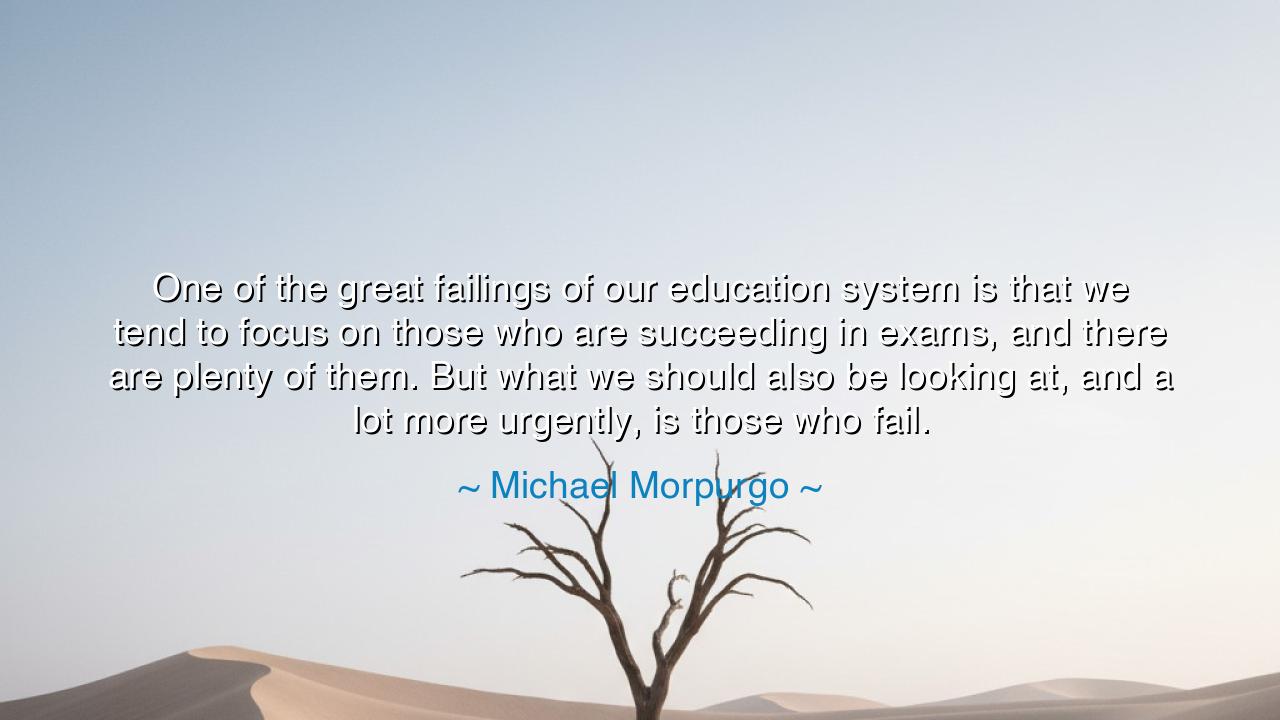
One of the great failings of our education system is that we tend
One of the great failings of our education system is that we tend to focus on those who are succeeding in exams, and there are plenty of them. But what we should also be looking at, and a lot more urgently, is those who fail.






Hear now the words of Michael Morpurgo, who in his wisdom declared: “One of the great failings of our education system is that we tend to focus on those who are succeeding in exams, and there are plenty of them. But what we should also be looking at, and a lot more urgently, is those who fail.” In this utterance, spoken with the voice of compassion, lies a truth as ancient as civilization itself: that the measure of a society is not found in how it praises the strong, but in how it lifts the weak. For the true purpose of education is not to crown the victors alone, but to awaken the light in every soul.
Too often, the world exalts the child who scores high upon the test, who masters the written word, who climbs the ladder of numbers and grades. These are honored, adorned, and praised. But what of the child who stumbles? What of the one whose hands are skilled, but whose mind does not bend easily to the rigid shape of examinations? What of the one whose heart is bright, yet unseen, because it does not fit the measure of the examiner’s scale? These, Morpurgo warns us, are left behind—forgotten in the shadows, while the applause is given to the few.
The ancients taught otherwise. Recall the story of the philosopher Diogenes, who saw value not in the honors of society but in the raw truth of human potential. He sought wisdom in places others ignored, even among beggars and strangers. Likewise, the great Teacher of Galilee, Jesus, lifted not the mighty but the humble, saying, “Blessed are the meek.” The lesson is eternal: those overlooked by the world may yet carry treasures unseen. So too in schools, the overlooked child may carry gifts beyond imagination, waiting only for recognition, guidance, and encouragement.
Consider the life of Thomas Edison, who as a boy was deemed “slow” by his teachers and removed from school. He failed within the narrow measure of exams, yet his mother saw beyond the verdict. She nurtured his curiosity, let his questions breathe, and in time he grew into one of the greatest inventors the world has known. Had society judged him only by his failures, the light bulb might have remained unlit, the phonograph unheard. His story stands as a beacon, proving Morpurgo’s truth: that we must look urgently to those who stumble, for within them may lie the genius of tomorrow.
The meaning of this quote cuts deeper still: failure is not an end but a beginning. Exams test memory and form, but they cannot measure resilience, creativity, kindness, or vision. To abandon those who fail is to abandon the very qualities that make humanity whole. It is to deny that greatness often rises from struggle, and that many of history’s giants were once cast aside by the narrow vision of their age.
Therefore, let us learn this lesson and engrave it upon our hearts: an education system that honors only success is incomplete. The truest education is not the sorting of winners and losers, but the lifting of all, the drawing forth of hidden talents, the strengthening of every soul to walk in dignity and hope. Let teachers see not only the hand that writes swiftly, but also the one that builds, the one that heals, the one that dreams.
Practical actions must follow. Encourage every child not only to pass, but to persevere. Create classrooms where failure is not a mark of shame but a step in the path of growth. Parents, celebrate not only the high score but also the effort given. Leaders, reform systems so that no child is invisible. And each of us, in our dealings with others, must look past appearances, seeking always the hidden worth.
Thus, let Morpurgo’s words become a guiding flame: do not look only to those who succeed, but urgently to those who fail. For the destiny of the world may rest not in the ones who pass with ease, but in the ones who struggle, fall, and rise again. In their struggle lies their strength, and in their strength may lie the salvation of generations.






AAdministratorAdministrator
Welcome, honored guests. Please leave a comment, we will respond soon